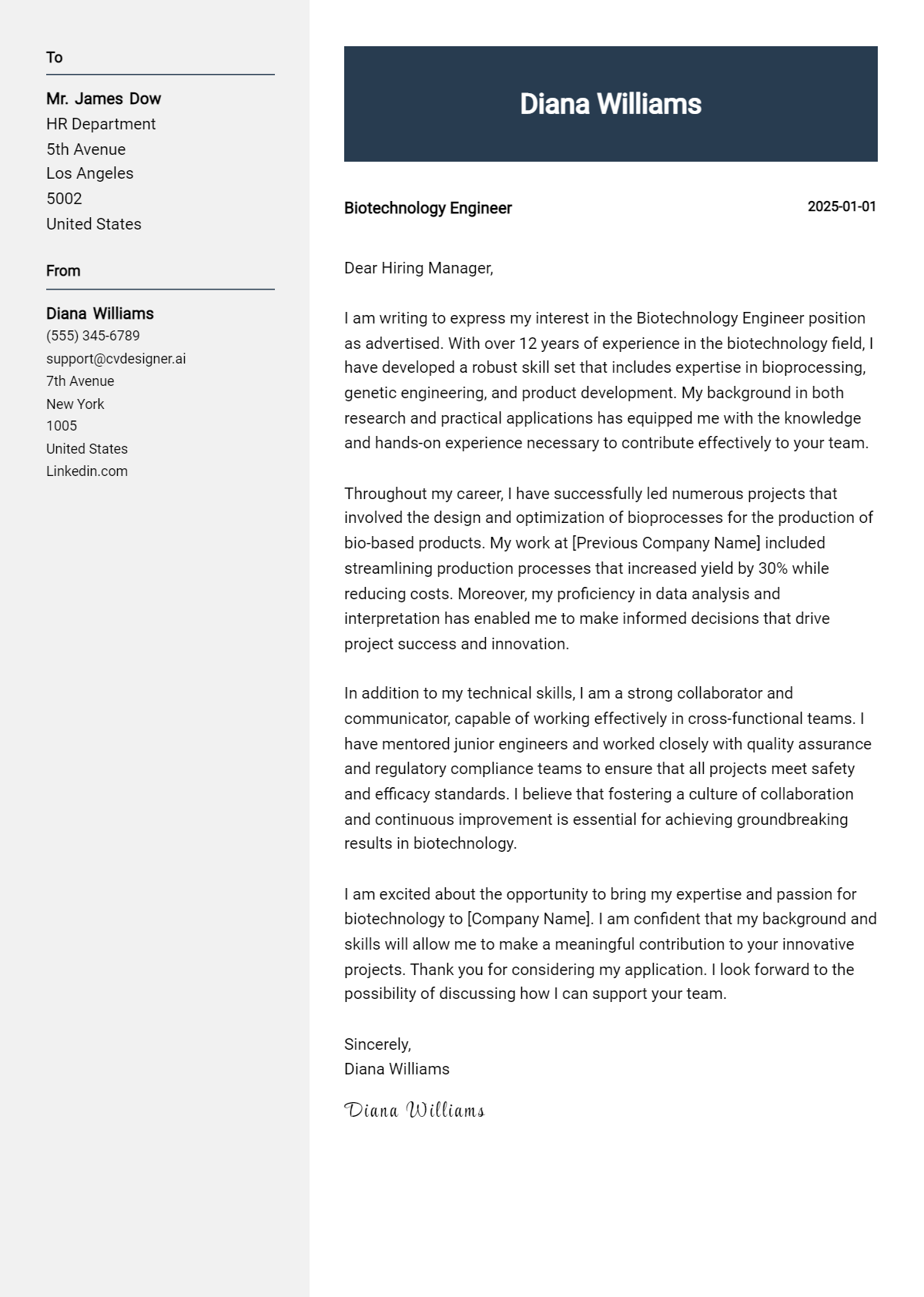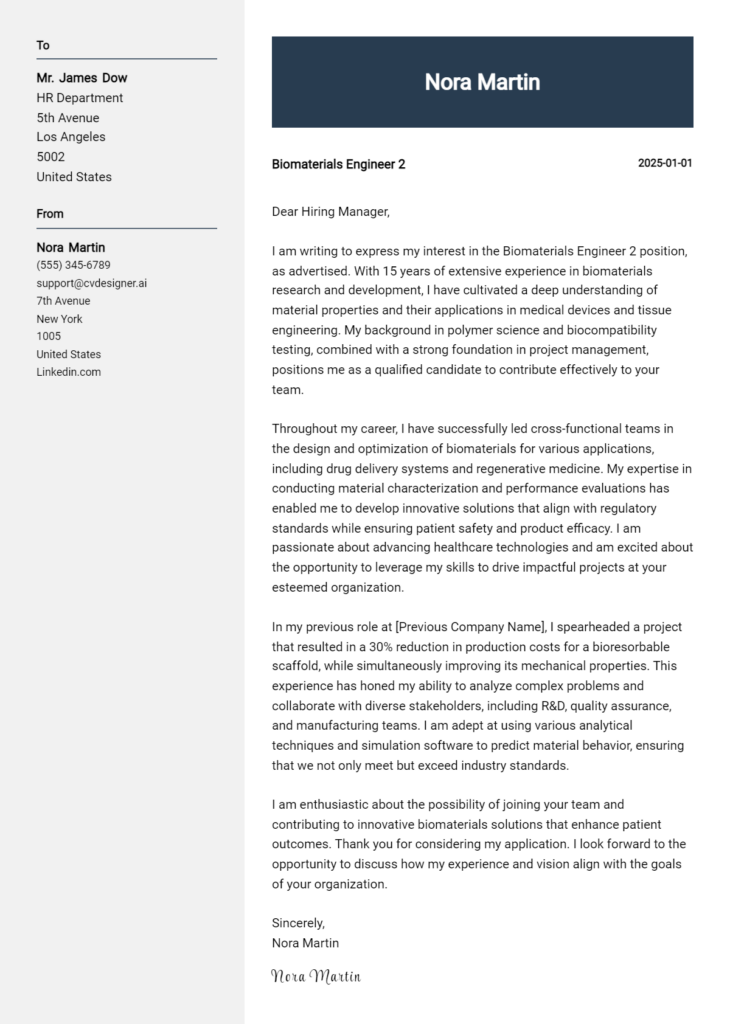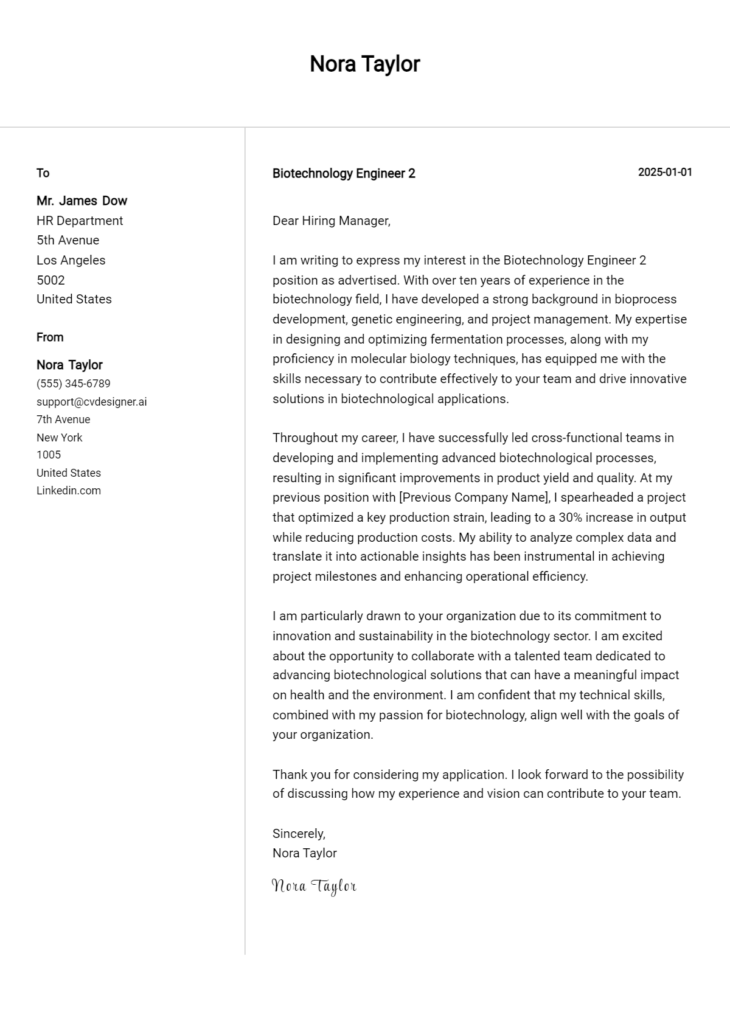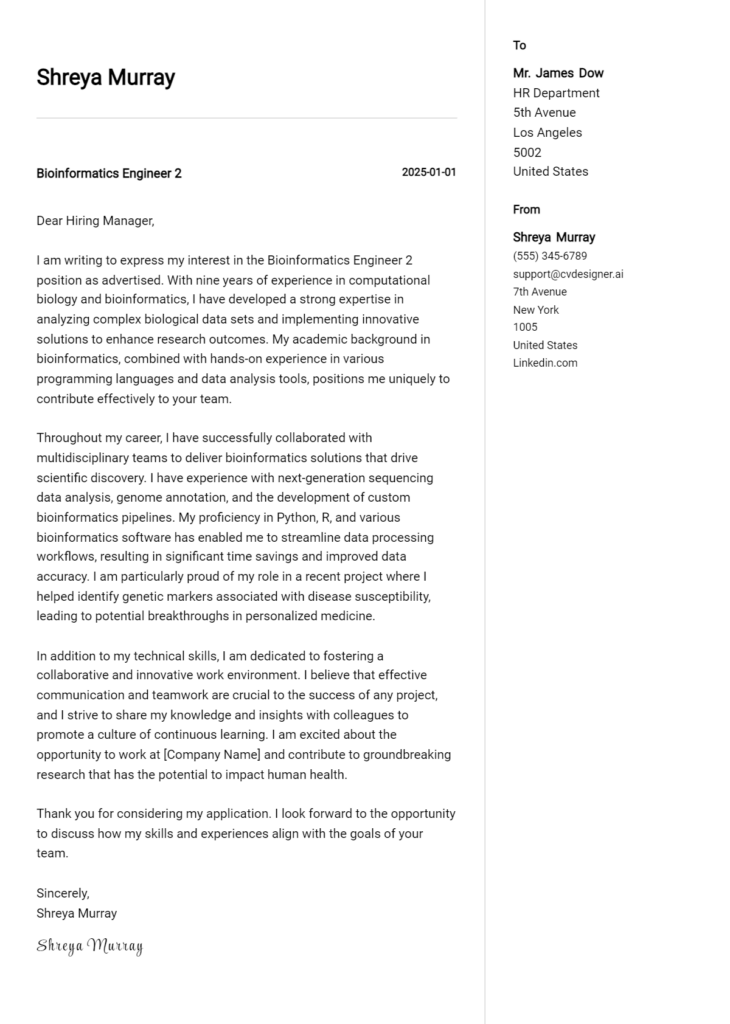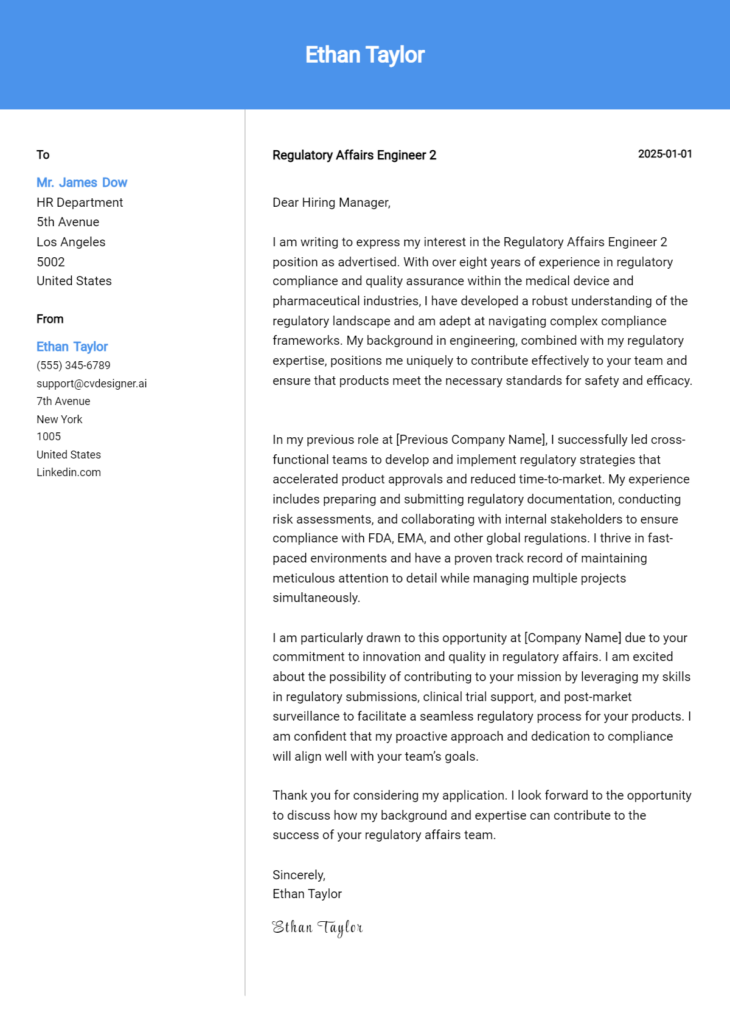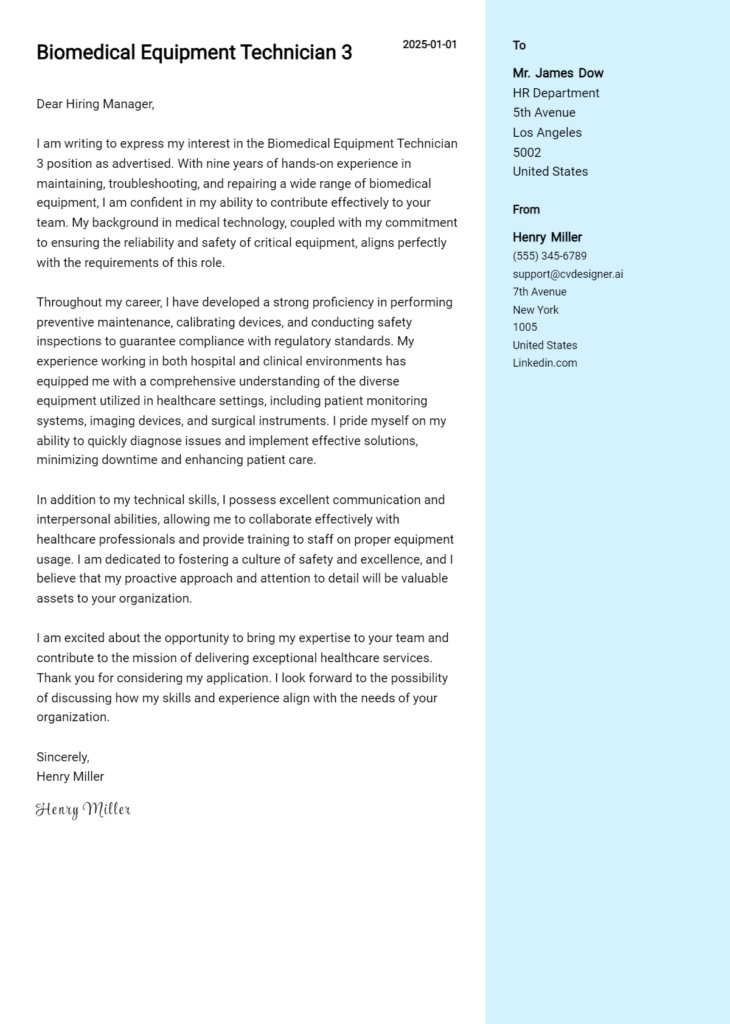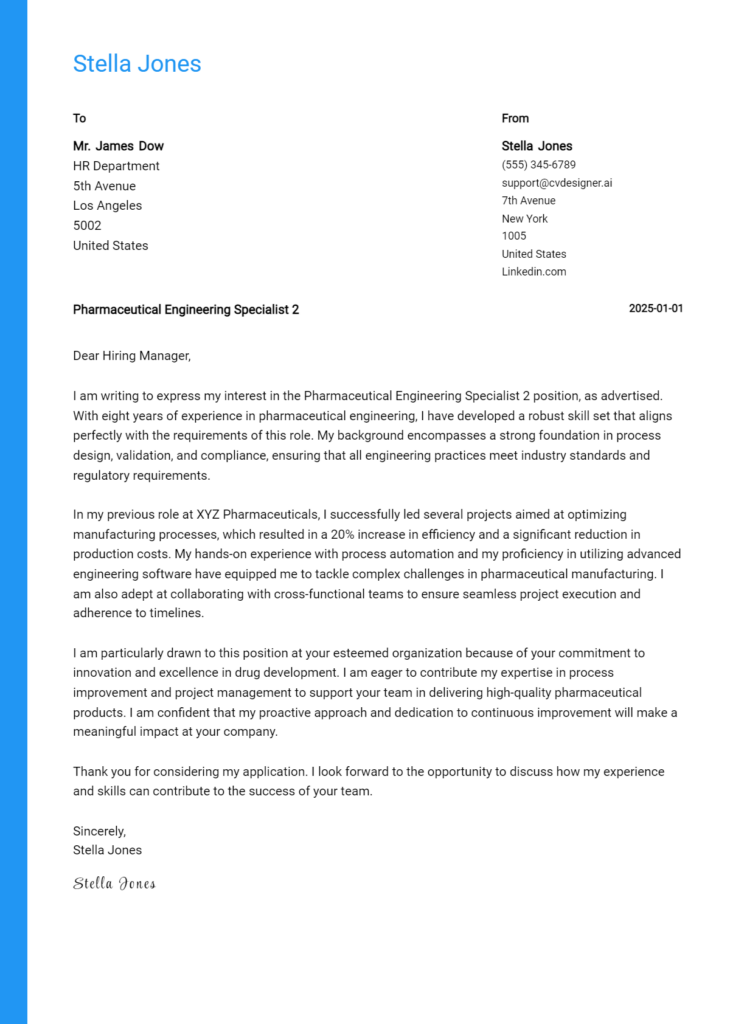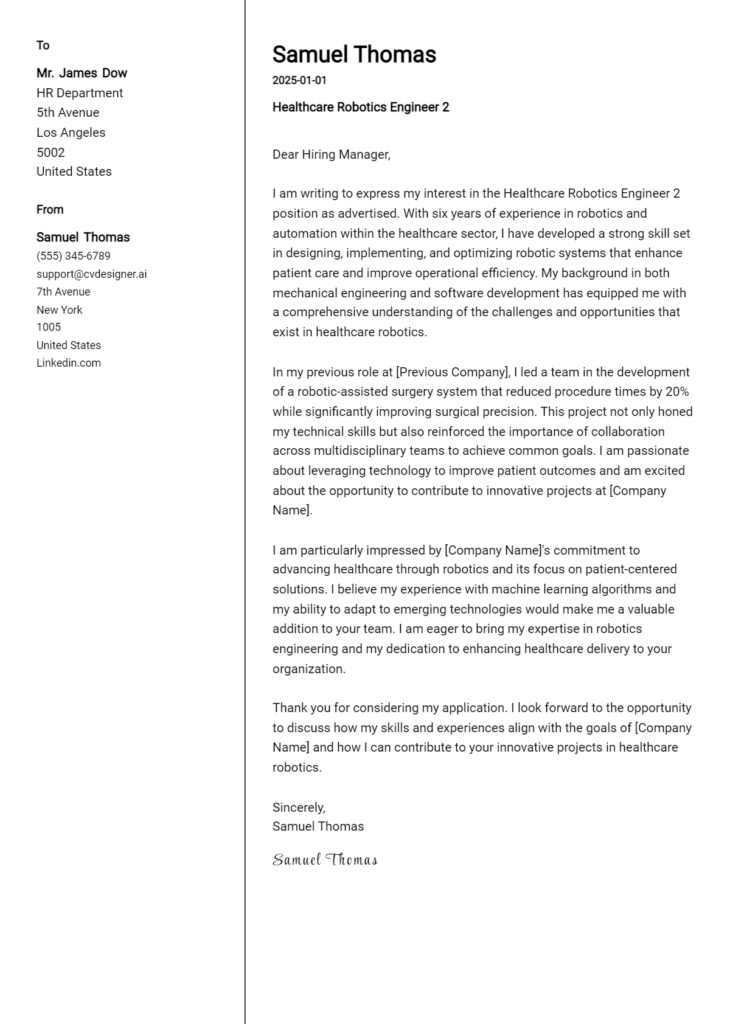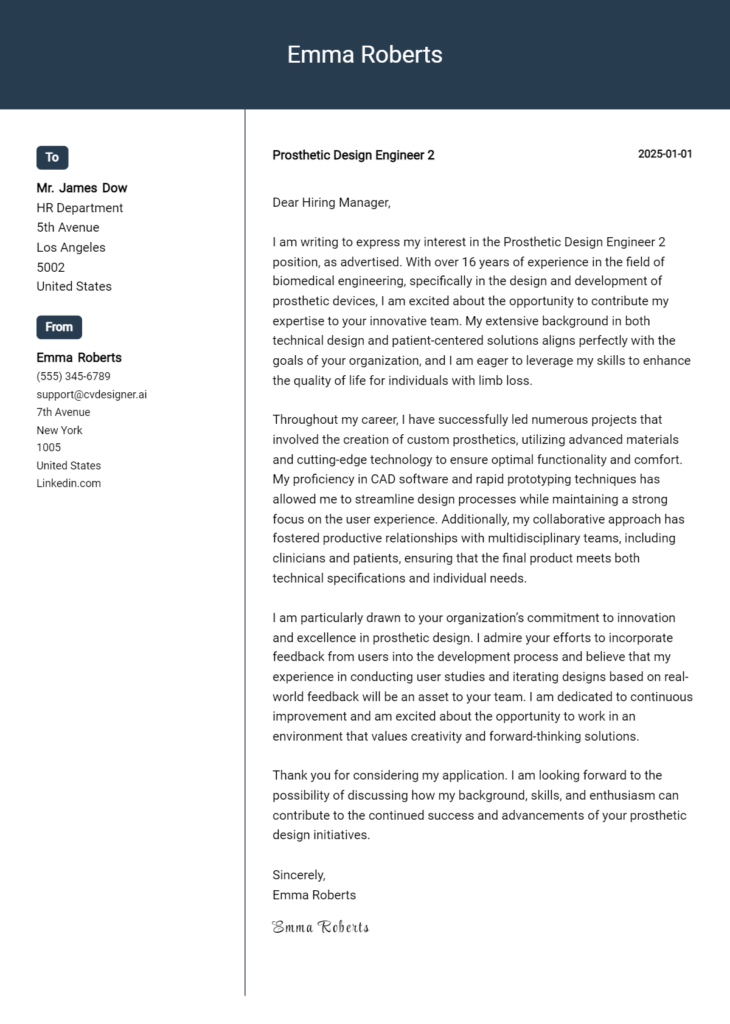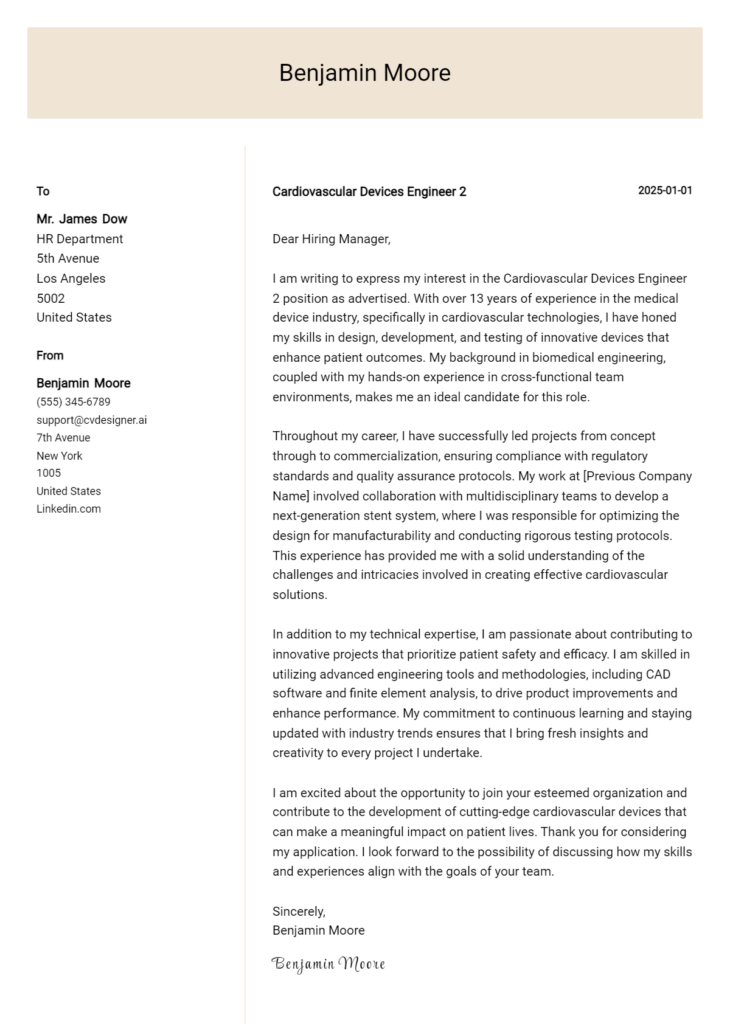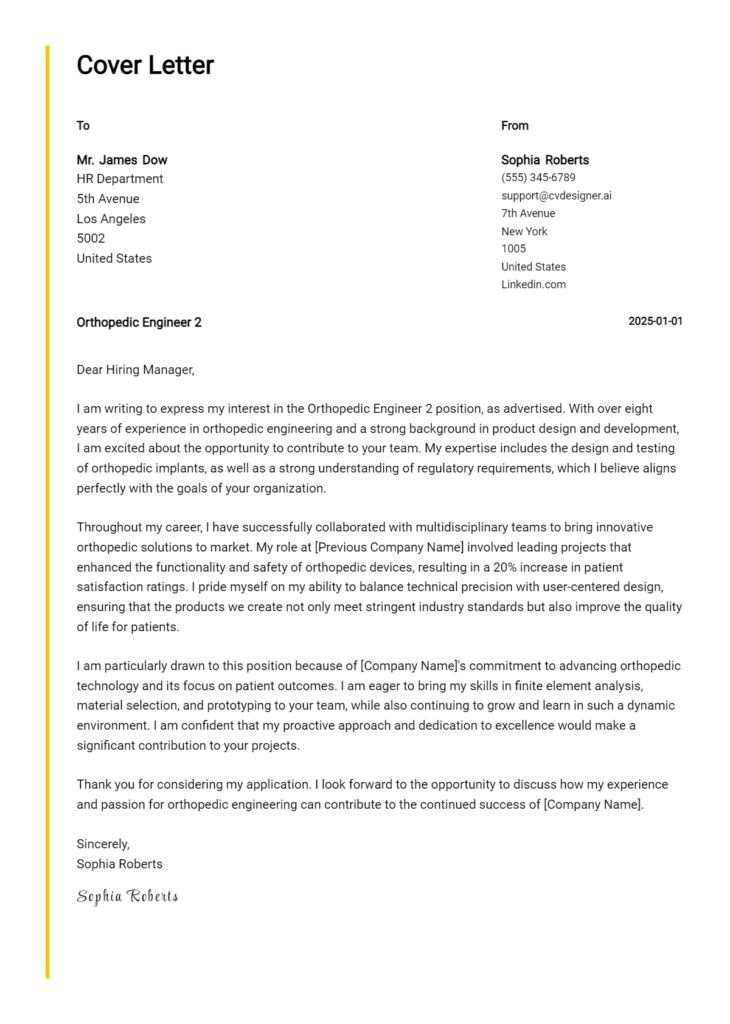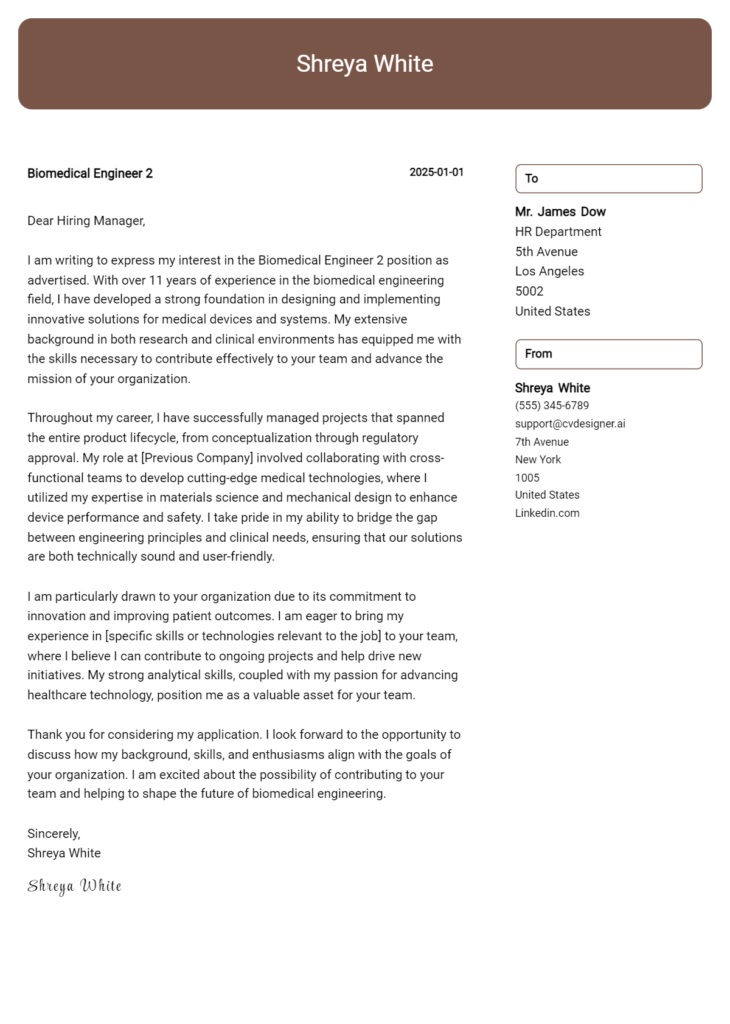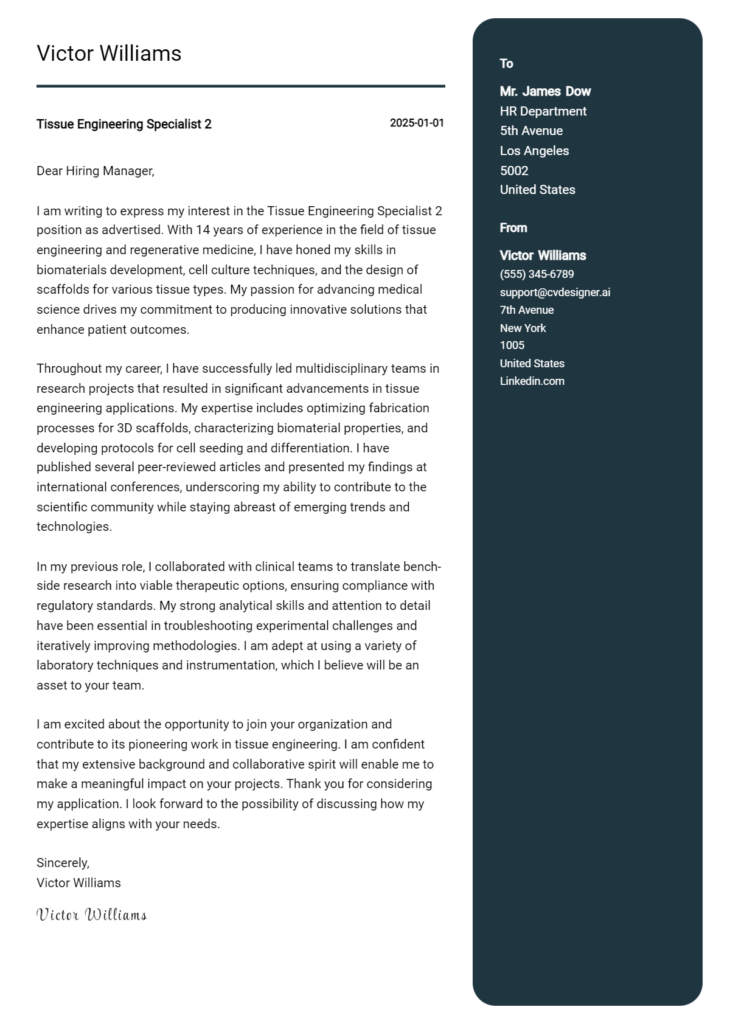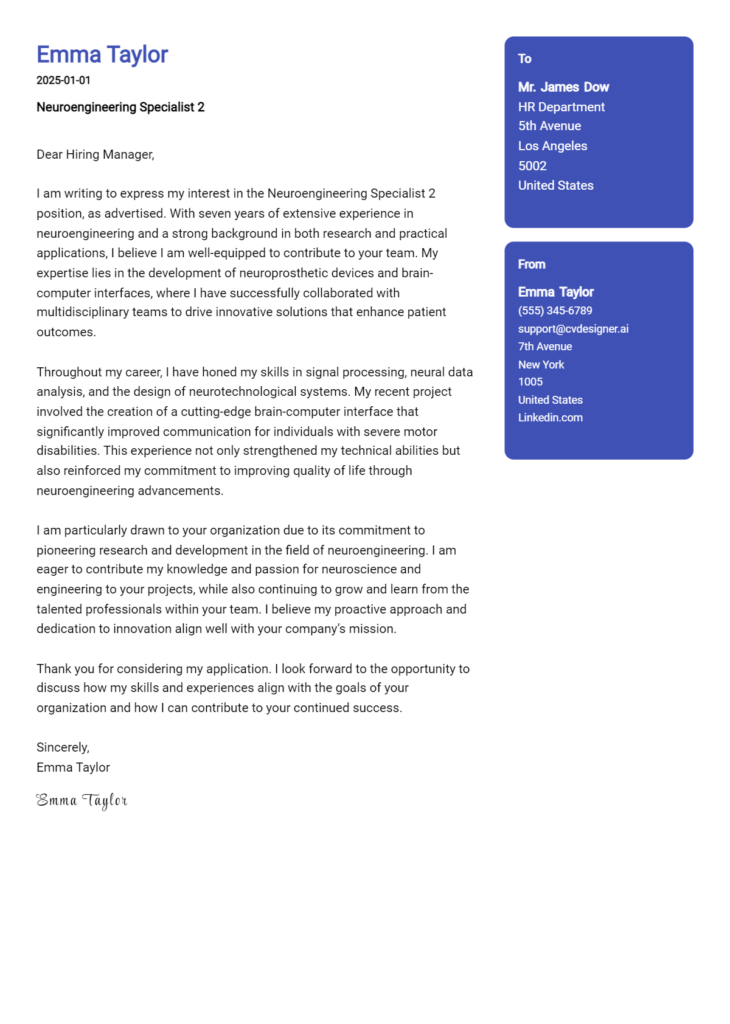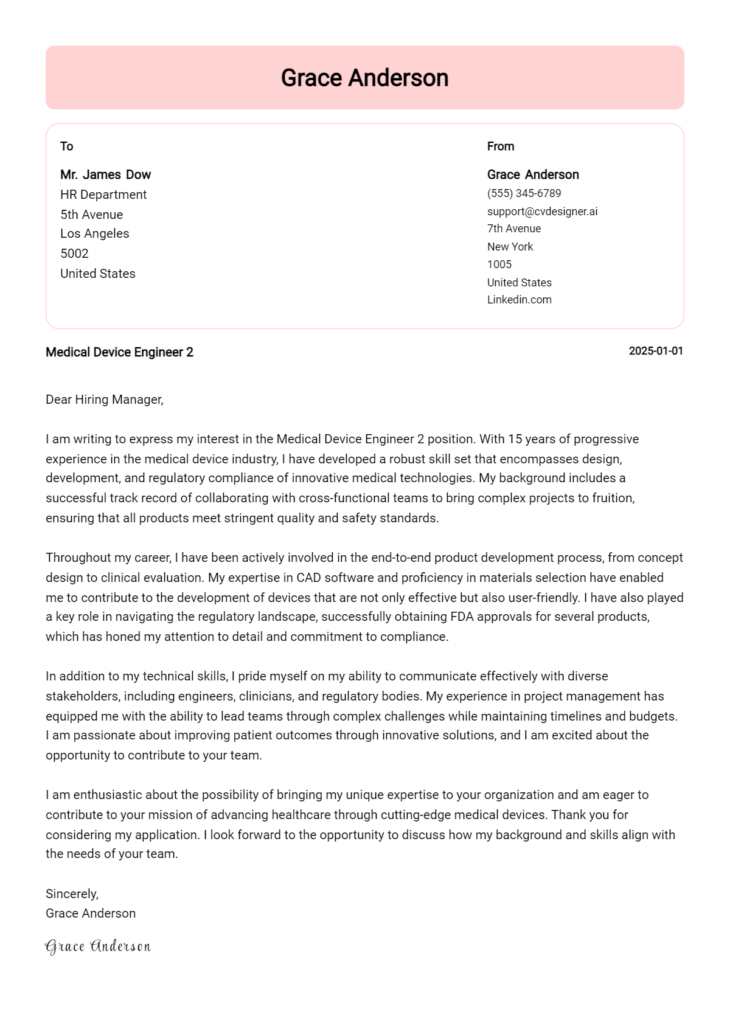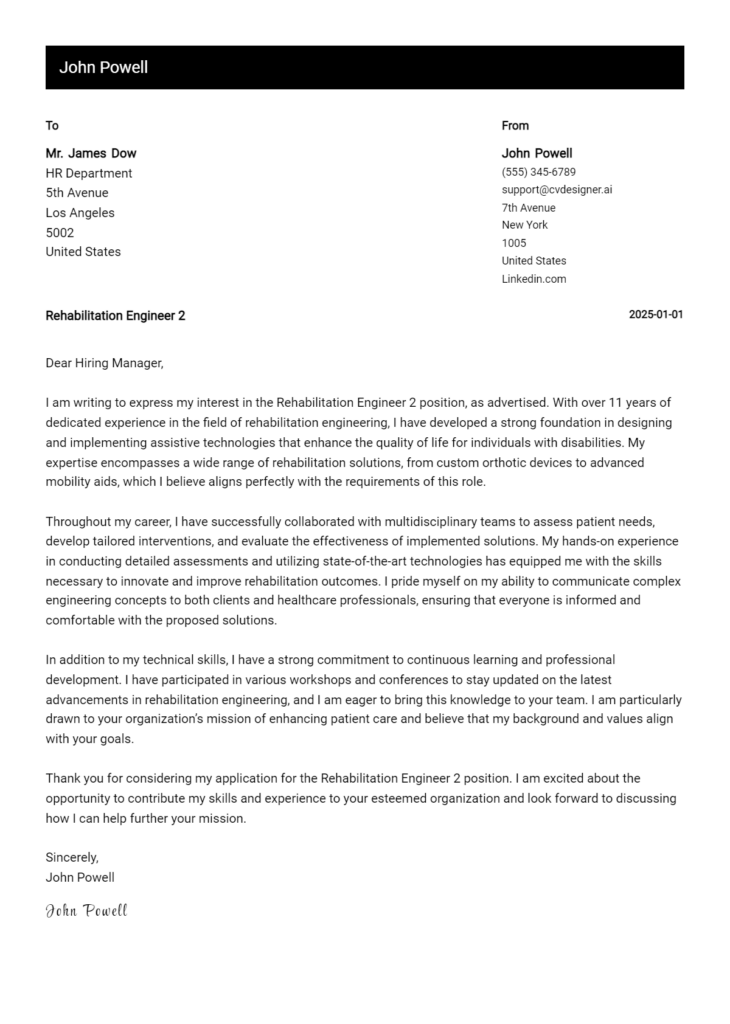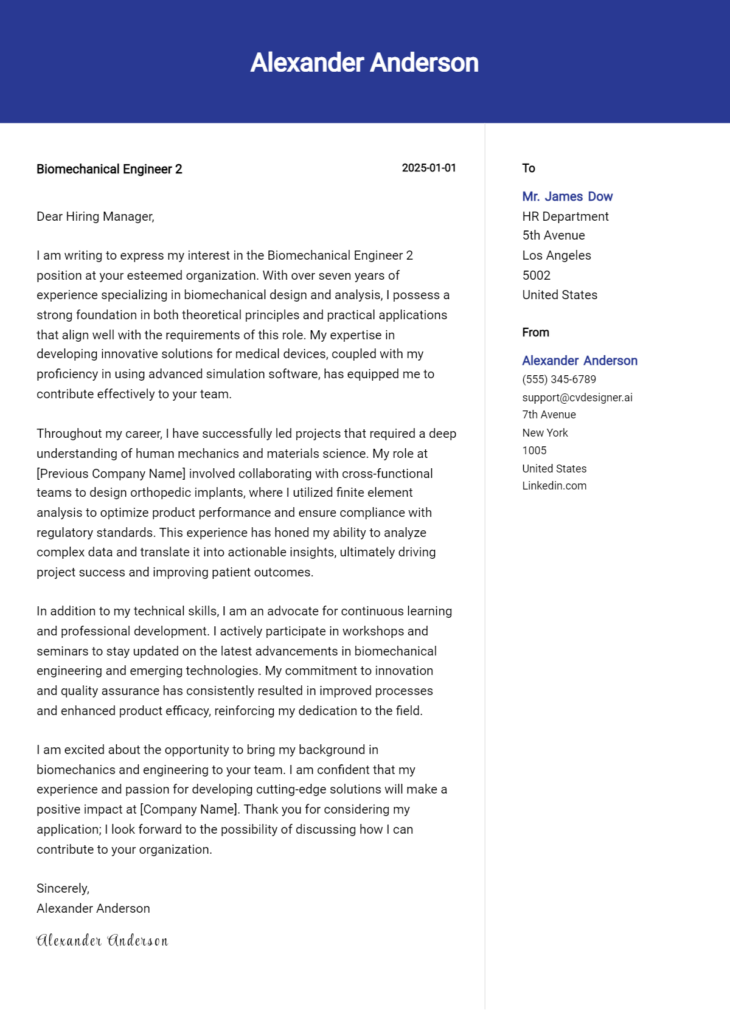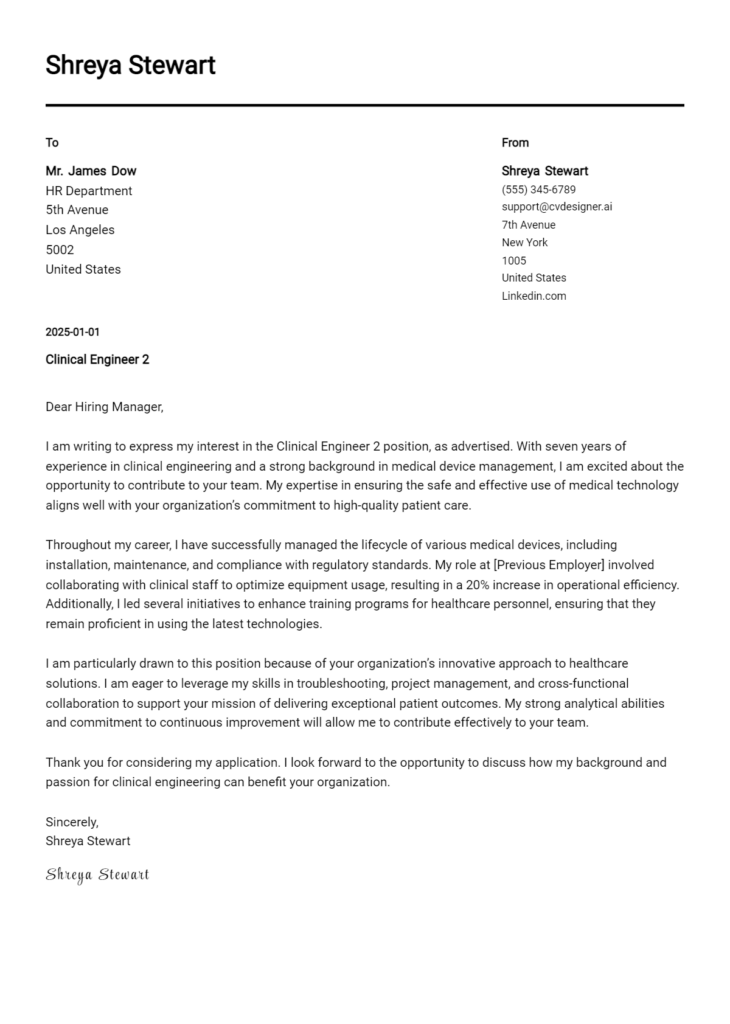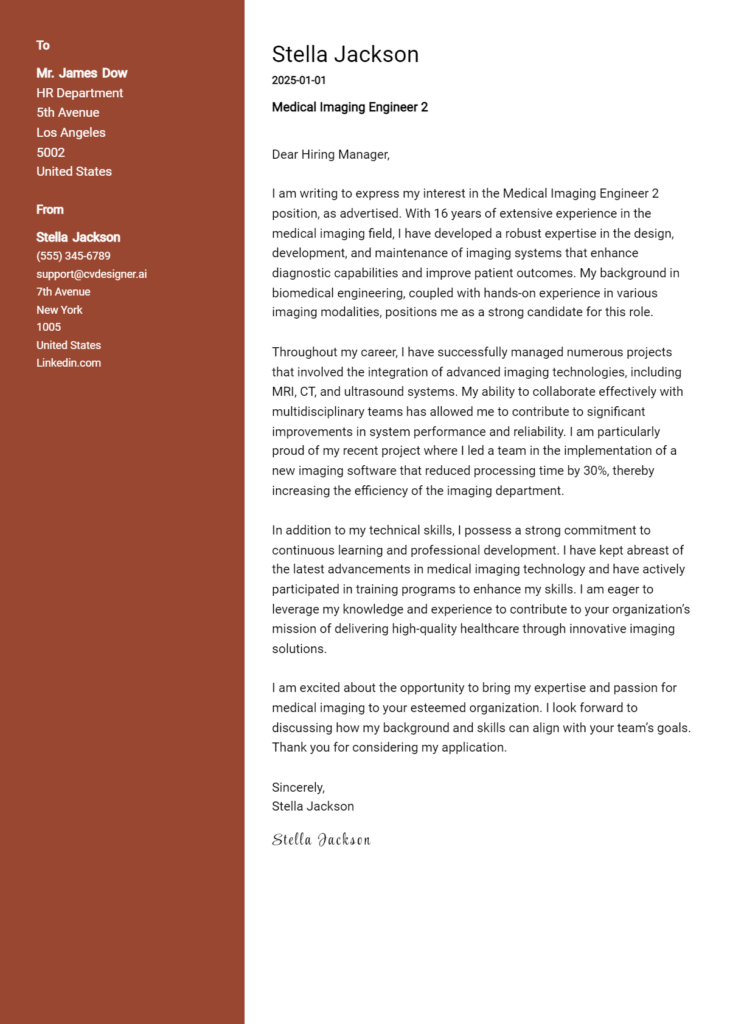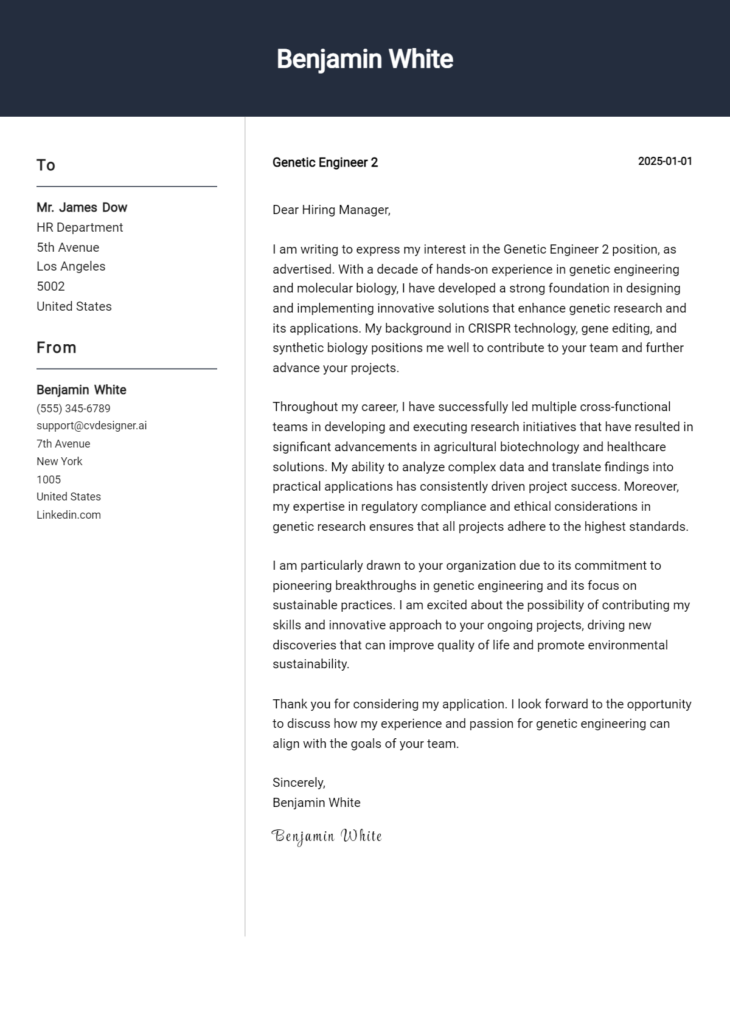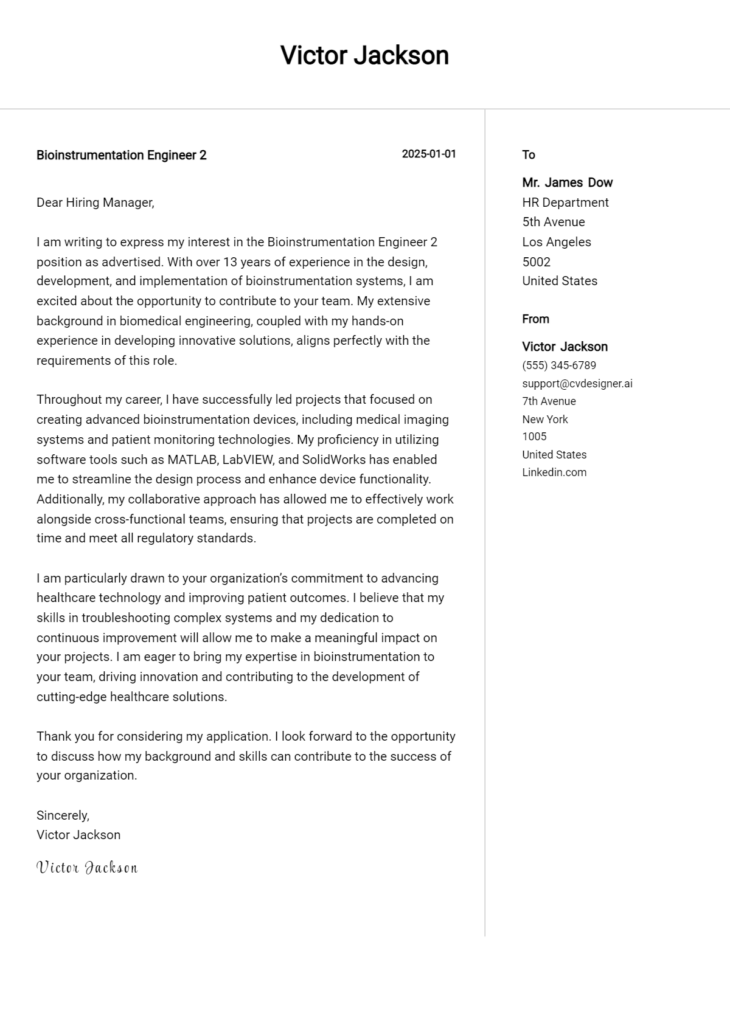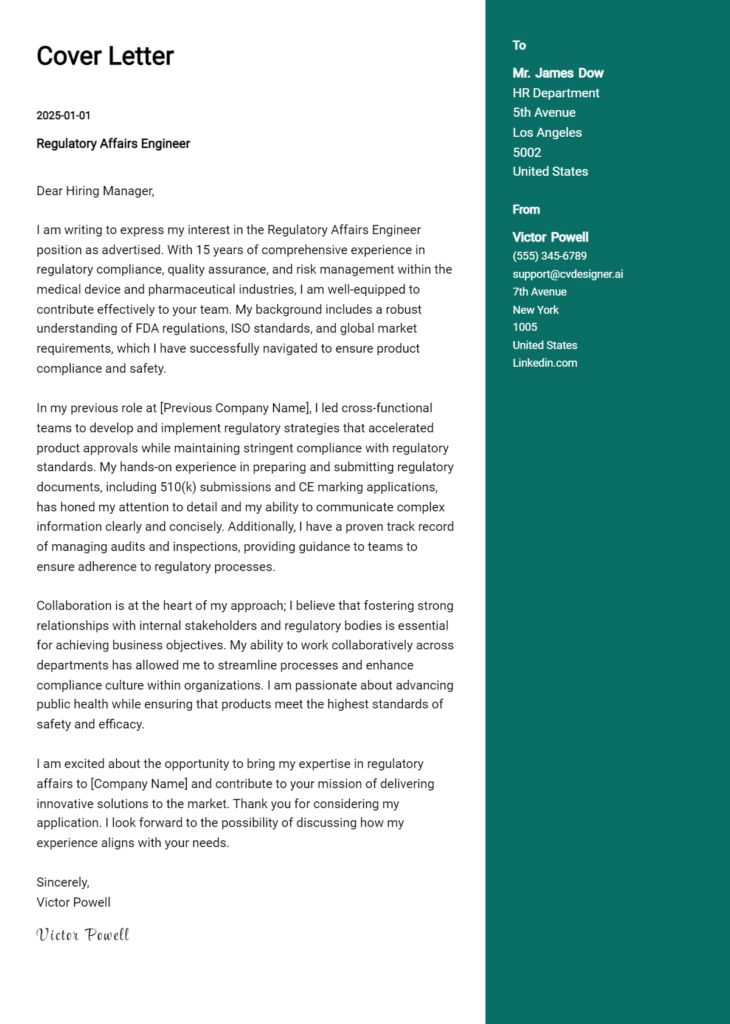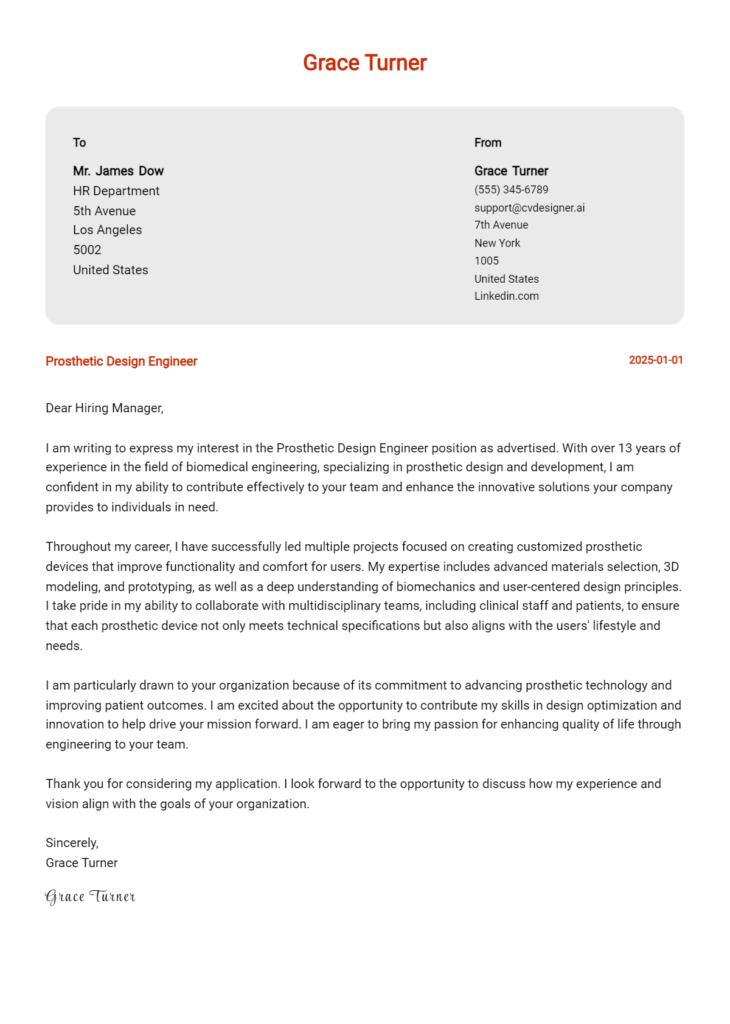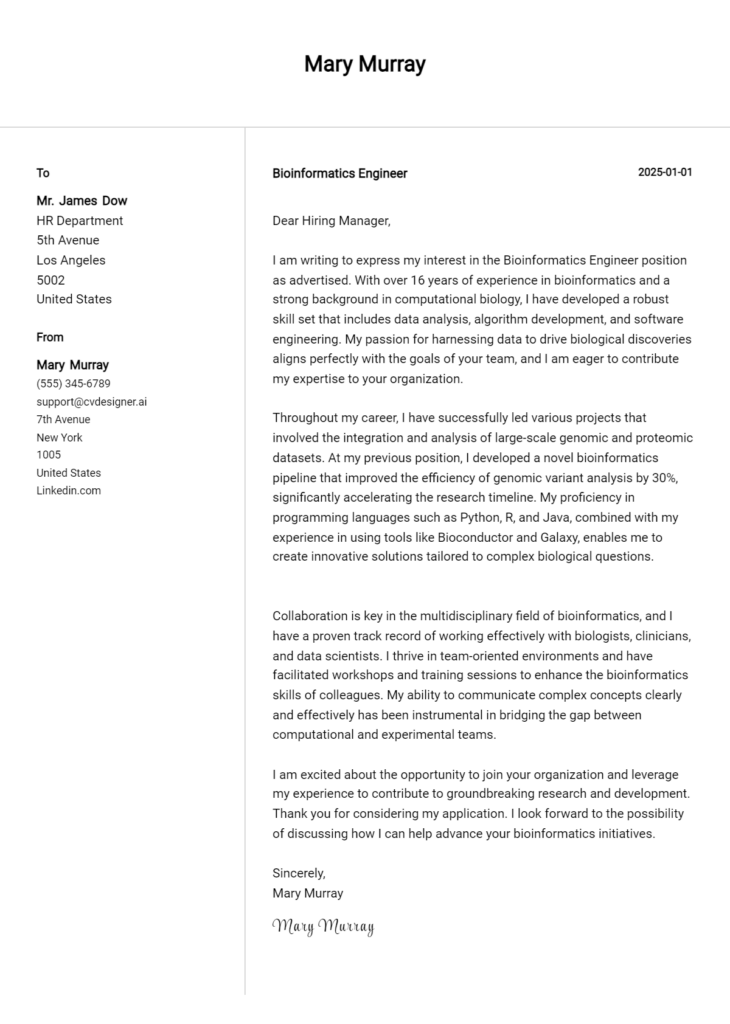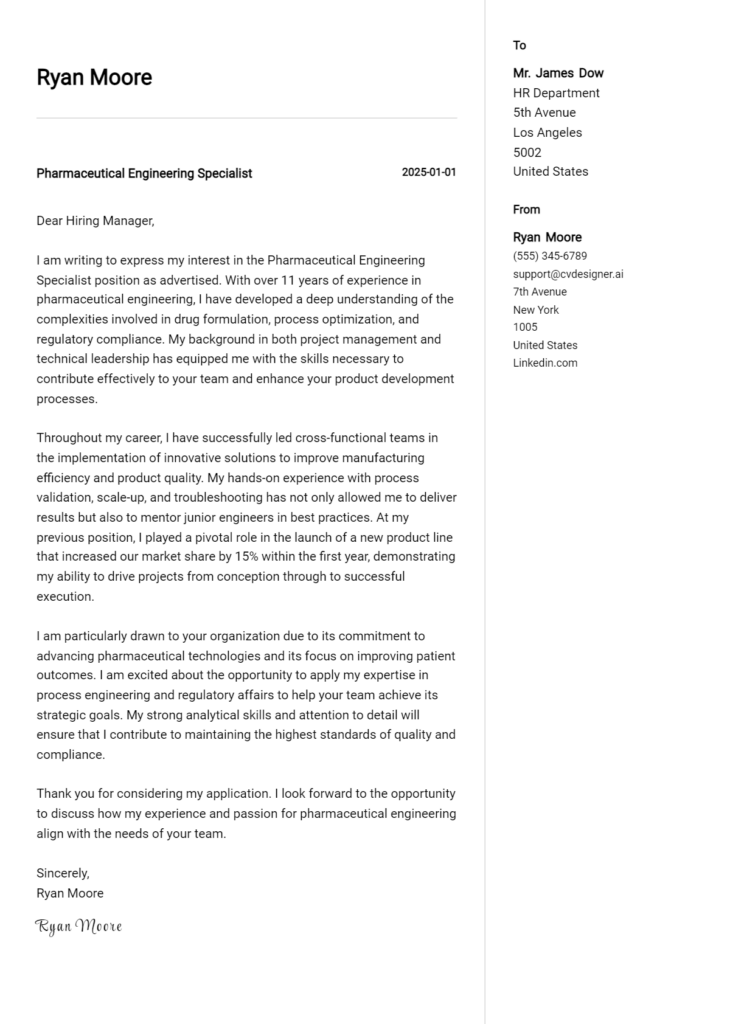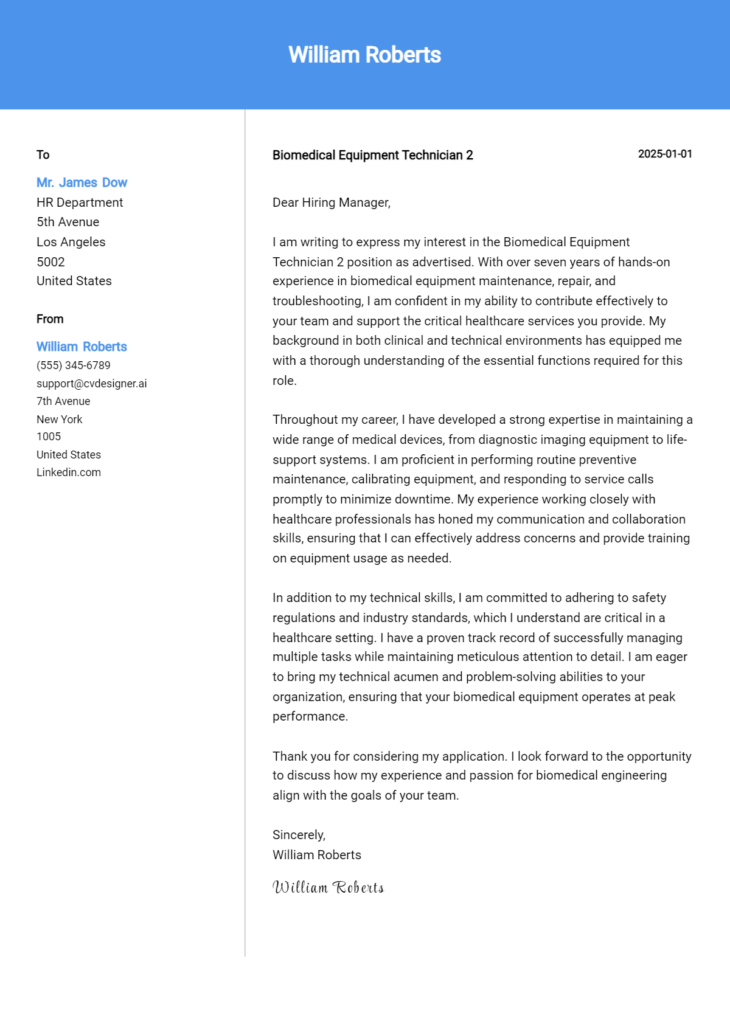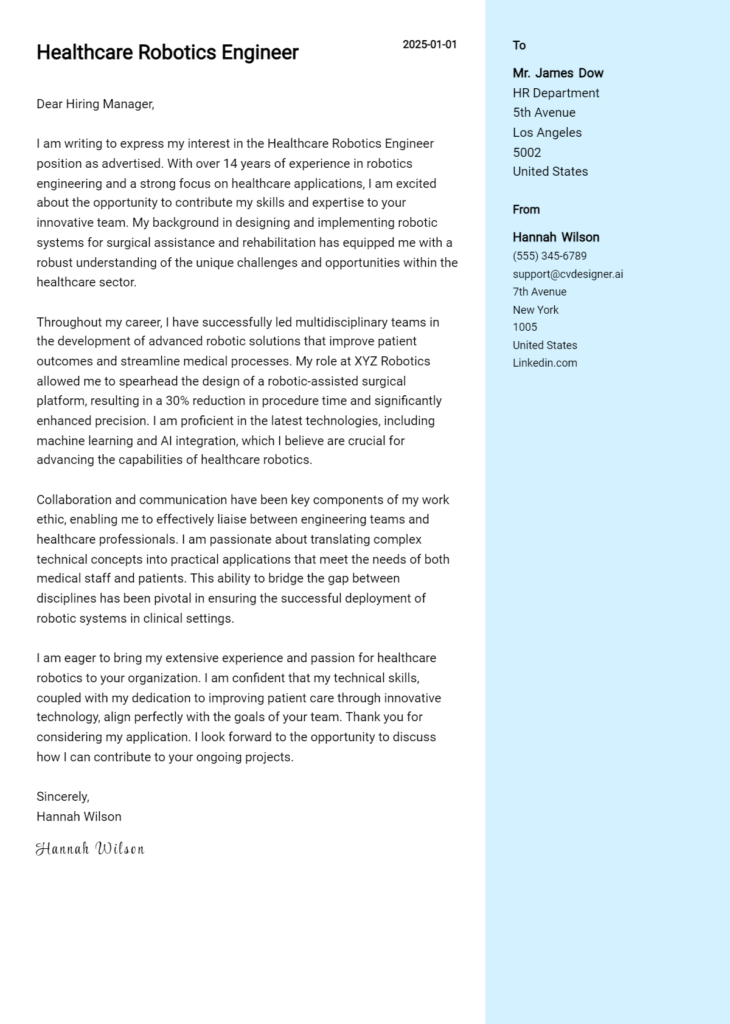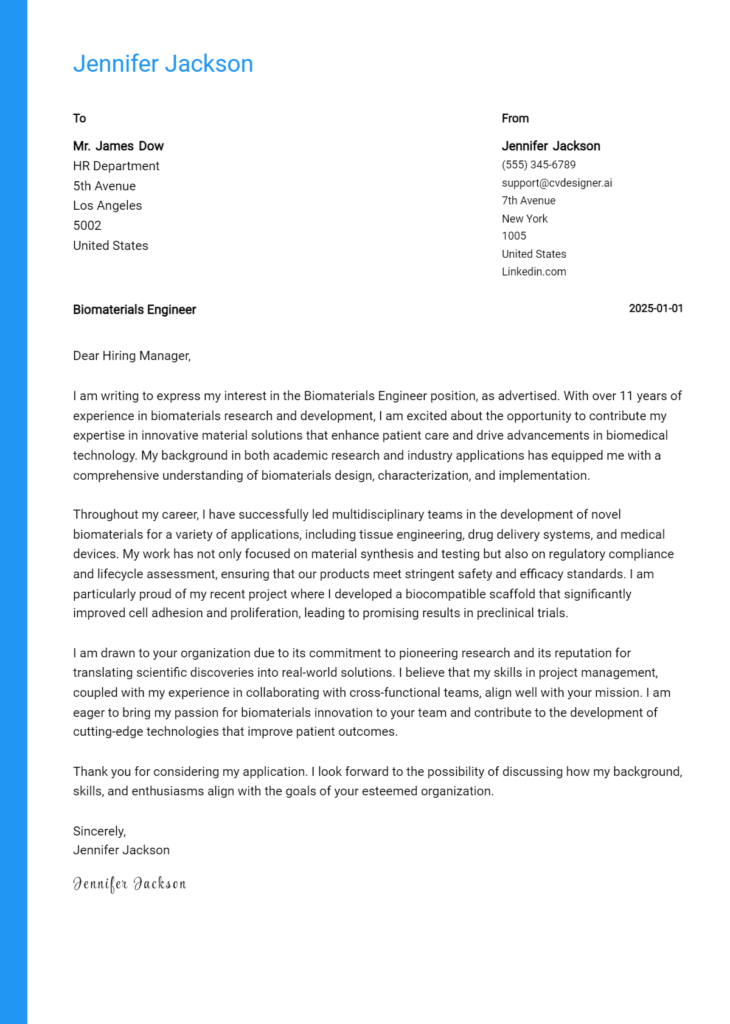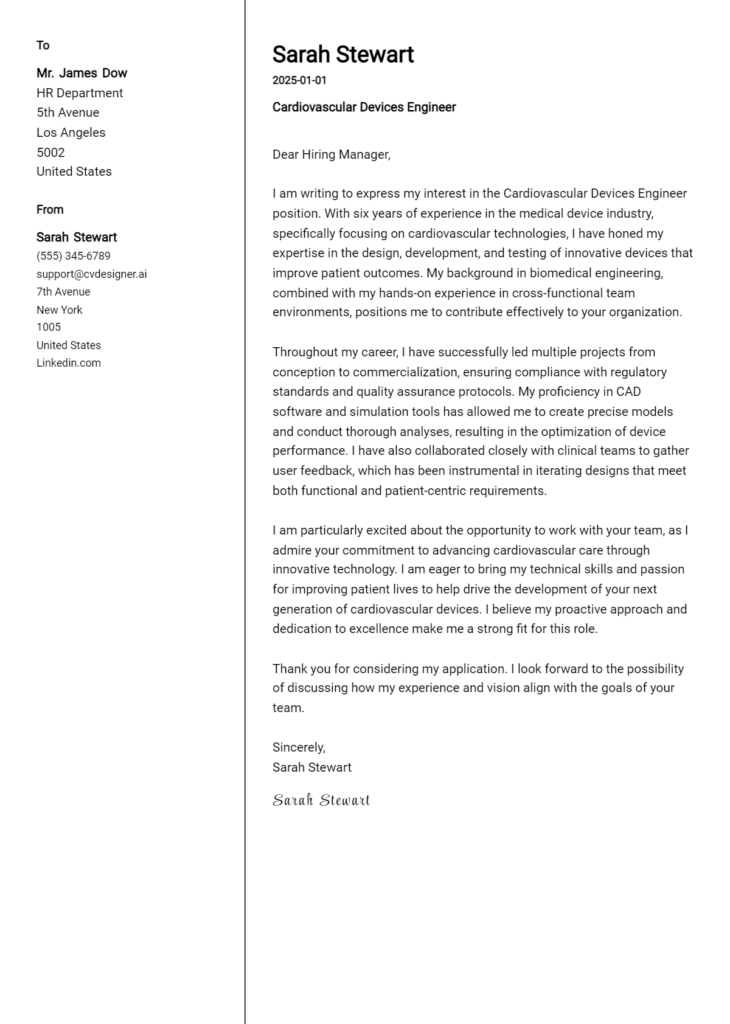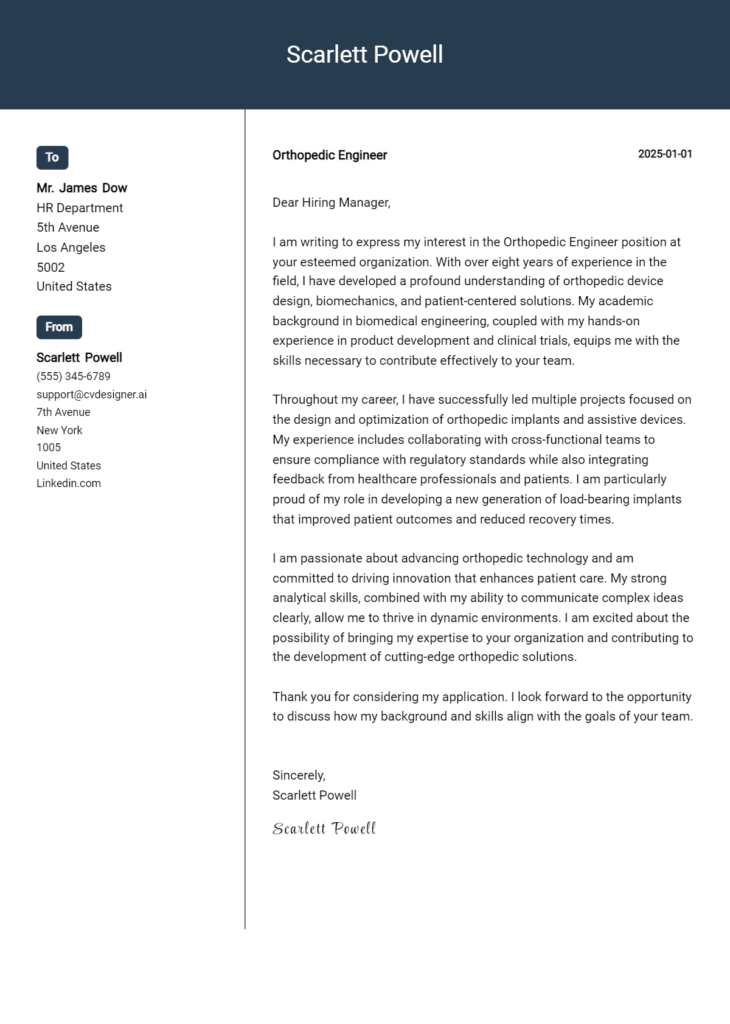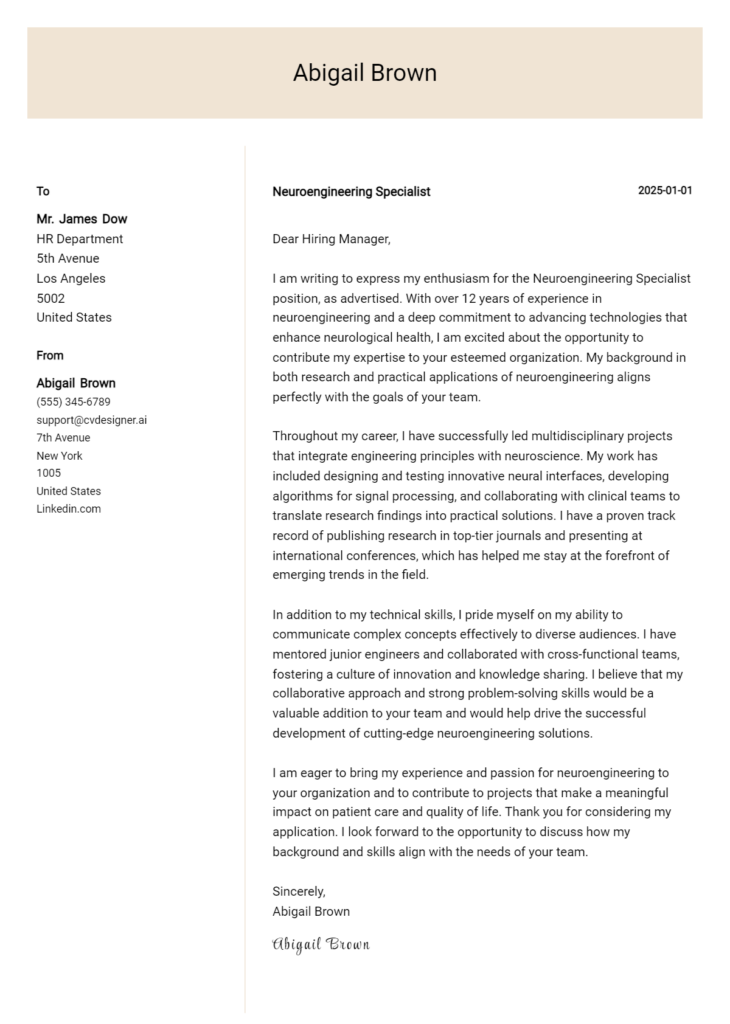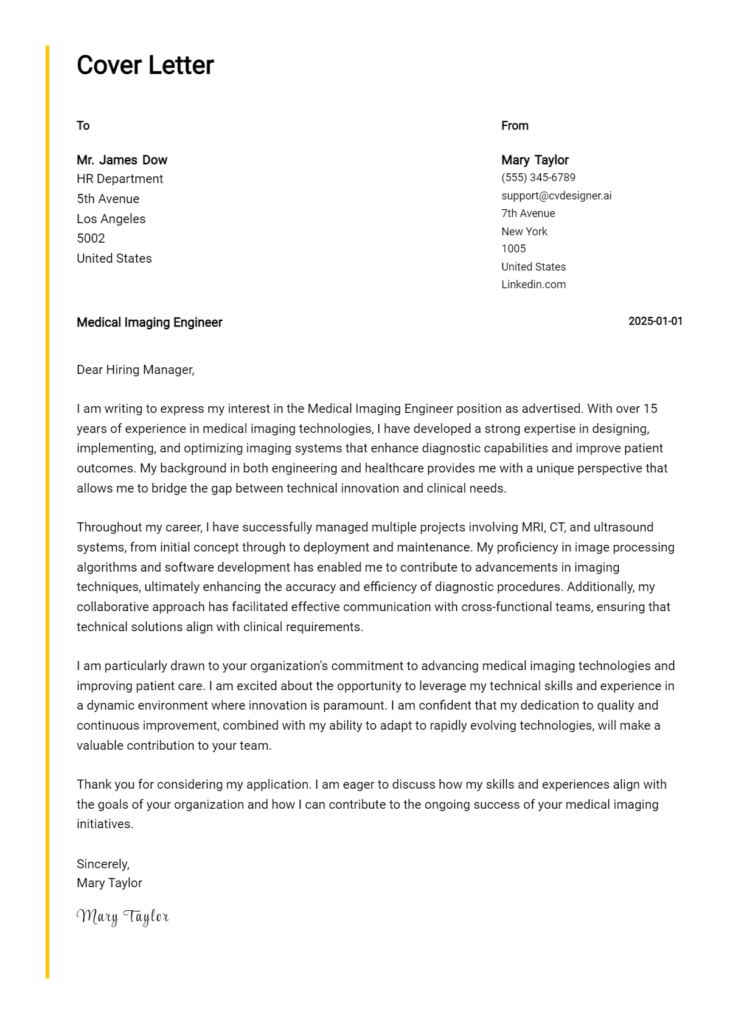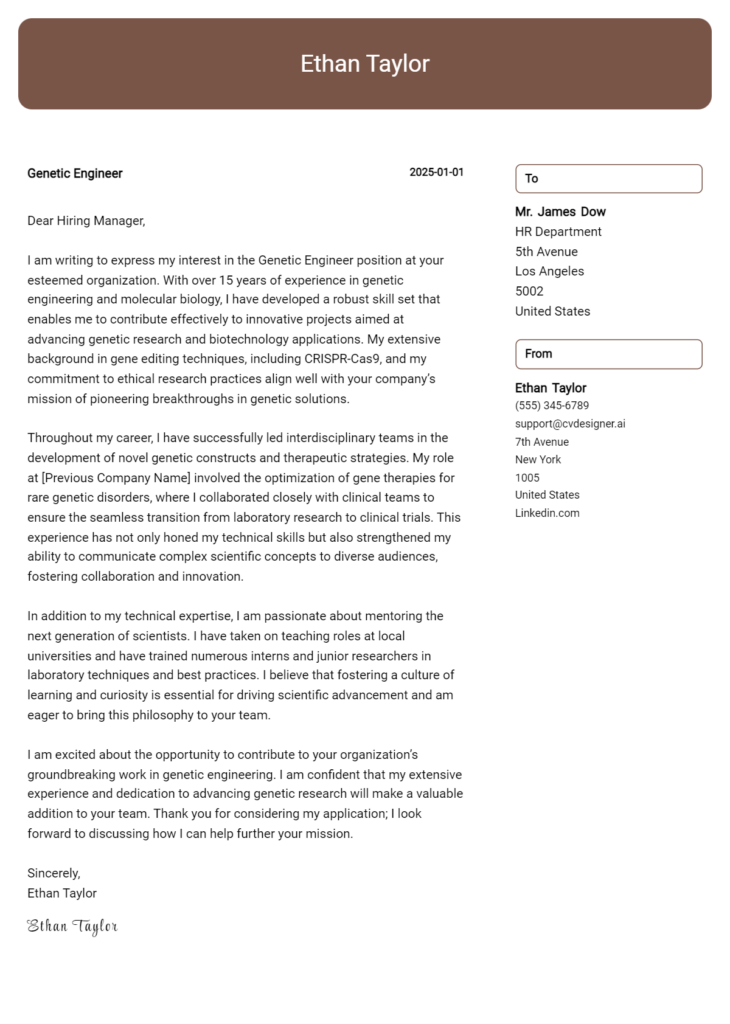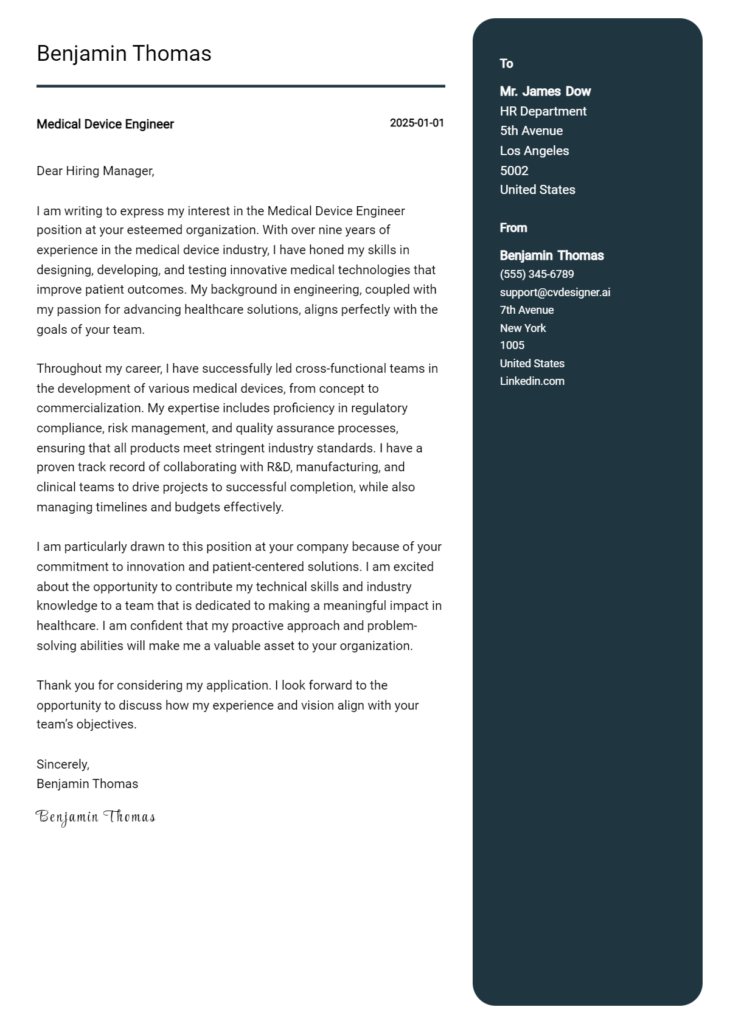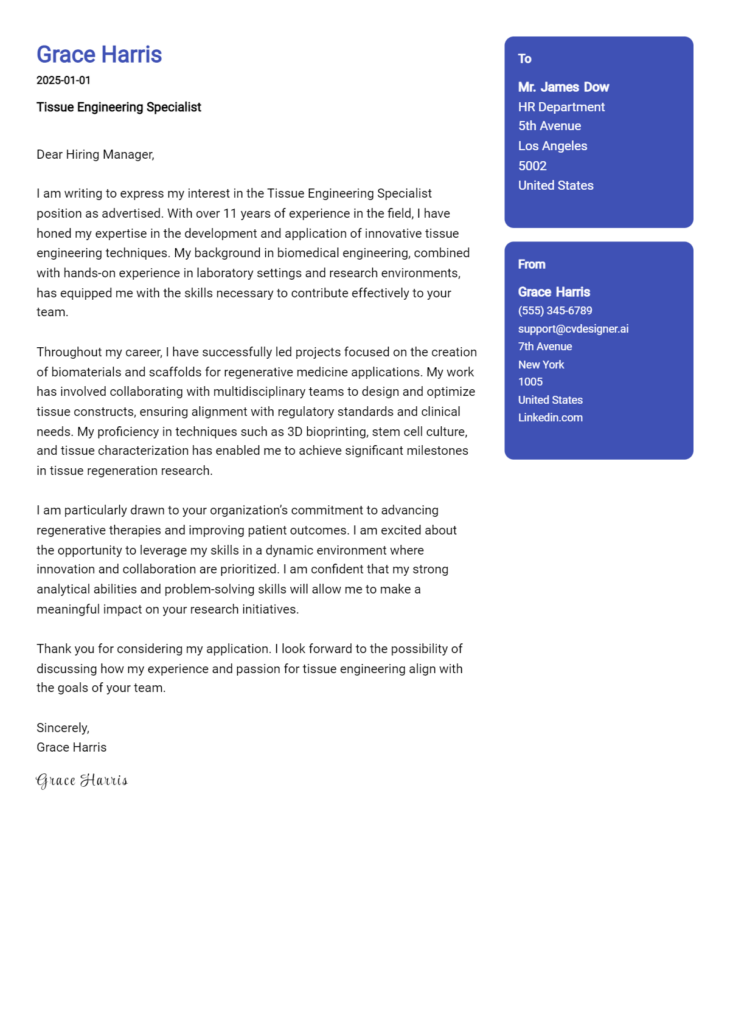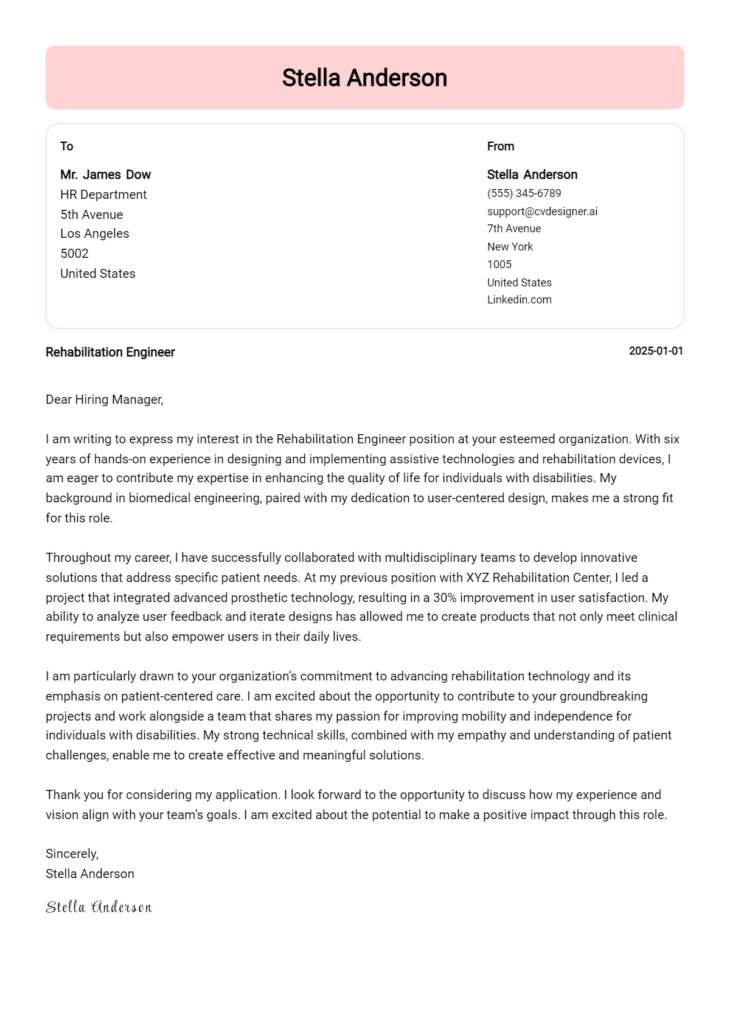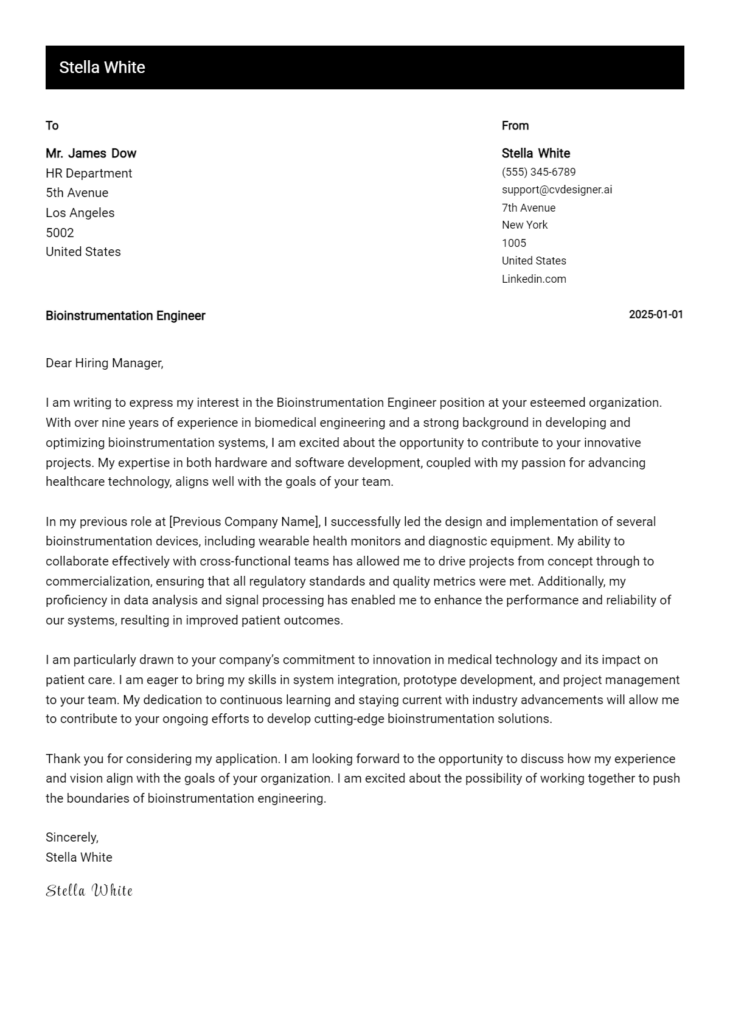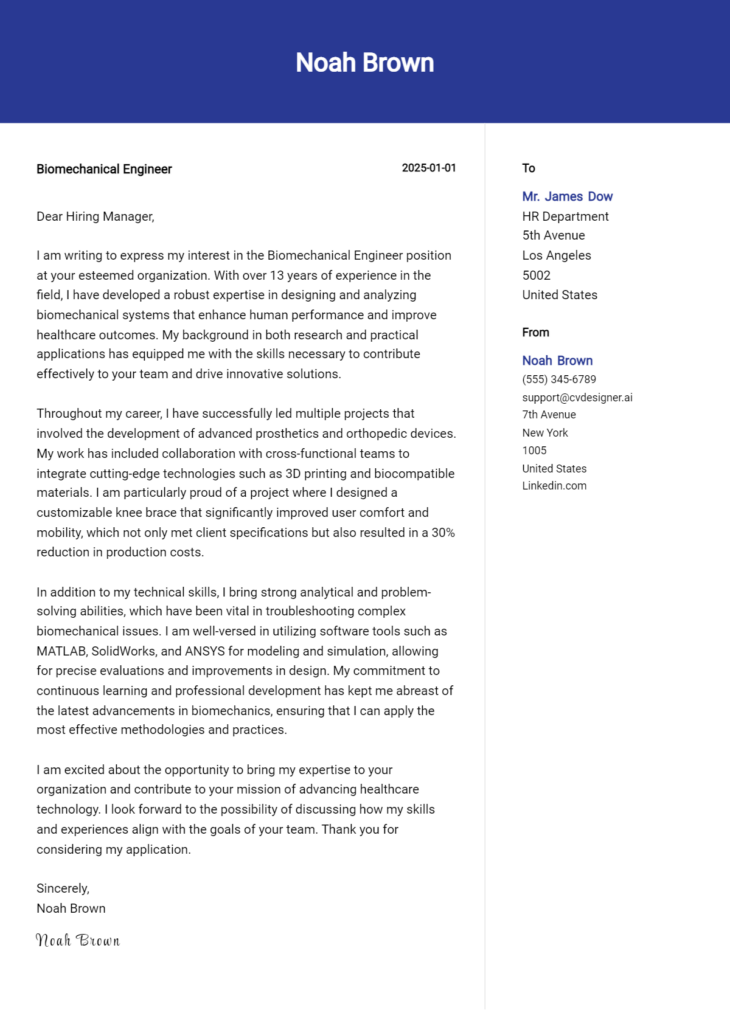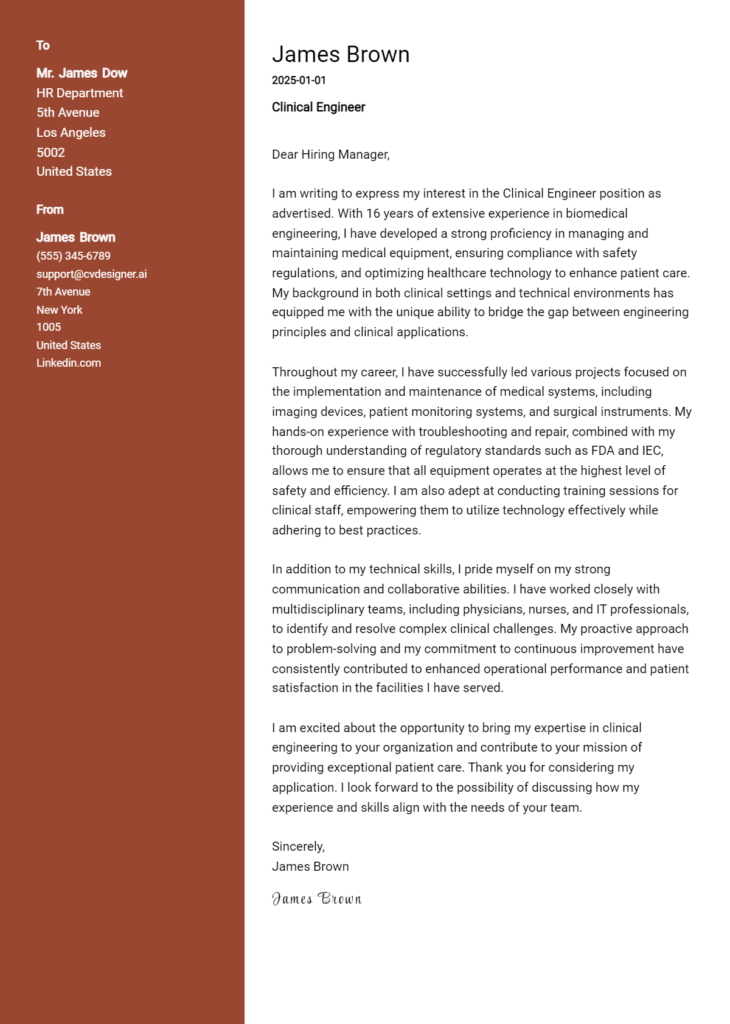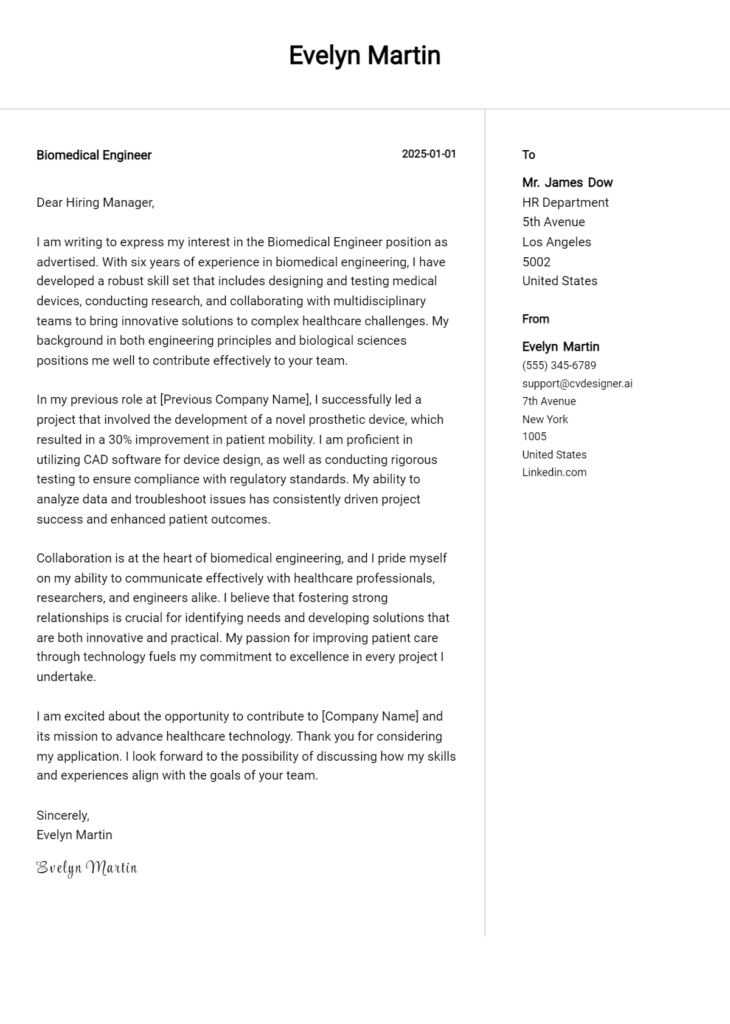Biotechnology Engineer Cover Letter Examples
Explore additional Biotechnology Engineer cover letter samples and guides and see what works for your level of experience or role.
How to Format a Biotechnology Engineer Cover Letter
Crafting an effective cover letter is essential for a Biotechnology Engineer, as it serves as your first opportunity to make a positive impression on potential employers. Beyond simply listing your qualifications, the format and structure of your cover letter reflect your scientific rigor, attention to detail, and ability to communicate complex information clearly—qualities that are vital in the biotechnology field. A well-structured cover letter not only engages the hiring manager but also showcases your professionalism and readiness to contribute to their team.
In this guide, we’ll explore how to format your cover letter, providing insights and biotechnology-specific examples to help you create a persuasive document.
We’ll focus on the critical components of a professional cover letter, including:
- Cover Letter Header
- Cover Letter Greeting
- Cover Letter Introduction
- Cover Letter Body
- Cover Letter Closing
Each section is integral to presenting your qualifications effectively. Let’s delve into each component and discuss how to make your biotechnology engineer cover letter shine.
Importance of the Cover Letter Header for a Biotechnology Engineer
The header of a cover letter is a crucial element, as it provides the first impression to potential employers. For a Biotechnology Engineer, clarity and professionalism in this section reflect attention to detail and organizational skills, which are vital in the field. The header should include your contact information, the date, and the recipient's details. This ensures that your letter is properly directed and that the employer can easily reach you. A well-structured header enhances the overall presentation of your application, setting a positive tone for the content that follows.
Strong Example
Jane Doe 123 Biotechnology Lane Bio City, BC 12345 jane.doe@email.com (123) 456-7890 October 1, 2023 Dr. John Smith Hiring Manager Biotech Innovations Inc. 456 Science Ave Research Town, RT 67890
Weak Example
jane doe email: jane.doe@email.com October 1st, 2023 Biotech Innovations
The Importance of the Cover Letter Greeting
The greeting of your cover letter plays a crucial role in setting the tone for the entire document. It serves as the first impression to the hiring manager, showcasing your professionalism and attention to detail. A personalized greeting that addresses the hiring manager directly not only demonstrates respect but also indicates your genuine interest in the position. To make your cover letter stand out, it's important to avoid generic greetings such as "To Whom It May Concern" or "Dear Hiring Manager." Instead, take the time to research the recipient's name through the company's website or LinkedIn. This small effort can significantly enhance the impact of your cover letter.
Strong Example
Dear Dr. Jane Smith,
Weak Example
To Whom It May Concern,
The Importance of a Compelling Cover Letter Introduction for a Biotechnology Engineer
A well-crafted cover letter introduction is crucial for a Biotechnology Engineer, as it serves as the first impression on the hiring manager. This opening paragraph should not only grab attention but also convey genuine interest in the role while briefly highlighting key skills or achievements relevant to the position. A strong introduction sets the tone for the rest of the letter, making it essential for candidates to articulate their qualifications effectively. Below are examples of strong and weak cover letter introductions for a Biotechnology Engineer to illustrate the difference.
Strong Example:
Dear [Hiring Manager's Name], As a passionate Biotechnology Engineer with over five years of experience in genetic engineering and bioprocess optimization, I am excited to apply for the position at [Company Name]. My background in developing innovative biopharmaceutical processes has not only enhanced product yield but also improved safety standards, making a significant impact in my previous role at [Previous Company]. I am eager to contribute my expertise in molecular biology and project management to your dynamic team.
Weak Example:
To Whom It May Concern, I am writing to apply for the Biotechnology Engineer position. I have some experience in the field and I think it could be a good job for me. I hope to bring my skills to your company, but I am not sure how they will fit into your projects.
Purpose of the Cover Letter Body for a Biotechnology Engineer
The body of a cover letter for a Biotechnology Engineer serves to effectively present the candidate's unique qualifications, expertise, and professional achievements to potential employers. It is an opportunity to highlight specific projects or accomplishments that demonstrate the candidate's ability to contribute to the company's objectives. By detailing relevant experiences, such as successful research initiatives, innovative solutions in biomanufacturing, or significant contributions to product development, the cover letter can convey the candidate's value and suitability for the role. A well-crafted body can differentiate a candidate from others by showcasing how their skills align with the company's needs and mission.
Strong Example
Dear Hiring Manager, I am excited to apply for the Biotechnology Engineer position at BioInnovate Solutions. In my previous role at GenTech Labs, I led a team in developing a novel bioreactor design that increased production efficiency by 30%, significantly cutting costs and improving overall yield. Additionally, my work on CRISPR gene-editing techniques resulted in the successful application of targeted modifications in plant cells, which improved their resilience to environmental stressors. I am eager to bring my expertise in molecular biology and process optimization to your innovative team, contributing to groundbreaking solutions in biotechnology. Sincerely, Jane Doe
Weak Example
Dear Hiring Manager, I am interested in the Biotechnology Engineer position at your company. I have some experience in the field and have worked on various projects. I think I can be a good fit for your team. I have done some lab work and learned about different techniques. I hope to contribute positively to your company. Best, John Smith
Importance of the Cover Letter Closing for a Biotechnology Engineer
The closing paragraph of a cover letter is crucial for leaving a lasting impression on potential employers. It serves as a summary of your qualifications, reiterates your enthusiasm for the position, and encourages the hiring manager to take the next step, whether that be reviewing your resume or scheduling an interview. A strong closing reinforces your fit for the role and expresses your eagerness to contribute to the organization, while a weak closing may lack clarity or fail to engage the reader. Here are examples of both:
Strong Example
In conclusion, my background in genetic engineering and hands-on experience with CRISPR technology make me an ideal candidate for the Biotechnology Engineer position at [Company Name]. I am excited about the opportunity to contribute to innovative projects that advance healthcare solutions. I look forward to the possibility of discussing how my skills align with your team’s goals. Thank you for considering my application; I hope to speak with you soon to further explore this opportunity.
Weak Example
Thanks for reading my letter. I think I might be a good fit for the job. You should check my resume or something. It would be nice to talk.
Crafting an effective cover letter is a crucial step for candidates aspiring to become Biotechnology Engineers. A well-written cover letter not only highlights your technical skills and problem-solving abilities but also demonstrates your understanding of the software development life cycle (SDLC), your capacity for teamwork, and your passion for continuous learning. Here are some tips to help you create a compelling cover letter that stands out to potential employers.
Tips for Writing a Cover Letter as a Biotechnology Engineer
Showcase Your Technical Skills
Clearly outline your technical expertise relevant to biotechnology, such as proficiency in molecular biology techniques, bioinformatics software, or laboratory automation. Use specific examples from your experience to demonstrate how these skills have contributed to past projects or research. This will help employers see your capability to handle the technical demands of the role.Emphasize Problem-Solving Abilities
Biotechnology often involves complex challenges that require innovative solutions. Share instances where you successfully identified problems and implemented effective solutions in your previous roles or academic projects. Highlighting your analytical skills will show employers that you're capable of tackling the challenges they face.Demonstrate Knowledge of the Software Development Life Cycle (SDLC)
If your role involves software applications for biotechnology processes, it’s essential to mention your familiarity with the SDLC. Explain how you've participated in different phases of software development, from requirements gathering to testing and deployment. This knowledge is vital for a role that intersects technology and life sciences.Highlight Teamwork and Collaboration Skills
Biotechnology projects often require collaboration across multidisciplinary teams. Provide examples of how you have worked effectively within teams, contributing to collective goals. Discuss your role in those teams and how your communication and interpersonal skills facilitated successful outcomes.Express a Passion for Continuous Learning
The field of biotechnology is constantly evolving, and demonstrating a commitment to lifelong learning can set you apart. Mention any relevant courses, certifications, or workshops you’ve attended, and discuss how you stay updated with industry trends. This not only shows your enthusiasm but also your proactive approach to professional development.
By following these tips, you can create a cover letter that effectively showcases your qualifications and enthusiasm for the Biotechnology Engineer role. For additional resources, consider exploring cover letter templates or using a cover letter builder to streamline your writing process.
Common Mistakes to Avoid in a Biotechnology Engineer Cover Letter
Crafting a compelling cover letter is essential for standing out in the competitive field of biotechnology engineering. Avoiding common mistakes can significantly enhance your chances of making a strong impression. Here are some pitfalls to watch out for and tips on how to steer clear of them:
Generic Content: Many candidates use a one-size-fits-all approach. Personalize your cover letter for each application by highlighting specific skills and experiences relevant to the job description.
Lack of Clarity: A cover letter should be clear and concise. Avoid jargon and overly technical language unless necessary. Aim for straightforward language that reflects your expertise without overwhelming the reader.
Ignoring Formatting: Poor formatting can make your cover letter look unprofessional. Follow a clean and organized cover letter format to enhance readability and presentation.
Focusing on Responsibilities Instead of Achievements: Instead of merely listing job responsibilities, emphasize your accomplishments and the impact you made in previous roles. Use quantifiable metrics to demonstrate success.
Neglecting to Research the Company: Failing to show knowledge about the company can signal a lack of interest. Research the organization and mention specific projects or values that resonate with you.
Typos and Grammatical Errors: Spelling mistakes can undermine your professionalism. Always proofread your cover letter or use tools to check for errors before submission.
Not Including a Call to Action: A strong closing statement can leave a lasting impression. Invite the hiring manager to discuss your application further by expressing enthusiasm for an interview.
By avoiding these common mistakes and incorporating effective strategies, you can create a standout cover letter. For inspiration, consider exploring various cover letter examples to find the style that best reflects your qualifications and aspirations.
Cover Letter FAQs for Biotechnology Engineer
What should I include in my cover letter as a Biotechnology Engineer?
In your cover letter, focus on your relevant experience, skills, and passion for biotechnology. Start with a strong introduction that mentions the position you're applying for and how you learned about it. Highlight specific projects or research you've worked on, emphasizing your technical skills such as genetic engineering, bioinformatics, or bioprocessing. Discuss your understanding of industry trends and regulations, demonstrating your knowledge of the field. Finally, express your enthusiasm for the company and how you can contribute to its goals, making sure to connect your background to the job requirements.
How can I make my cover letter stand out in the biotechnology field?
To make your cover letter stand out, personalize it to the company and position. Research the company’s mission, recent projects, and its contributions to the biotechnology field. Use specific examples from your experience that align with their work, showcasing your unique skills and achievements. Incorporate industry-specific language to demonstrate your familiarity with biotechnology concepts and terminologies. Additionally, convey your passion for the field and how your values align with the company’s vision. A compelling narrative about your career journey can also engage the reader and leave a lasting impression.
How long should my cover letter be for a Biotechnology Engineer position?
Your cover letter should ideally be one page long, consisting of three to four paragraphs. Aim for a length of around 300 to 400 words. This length allows you to provide enough detail about your qualifications while remaining concise and focused. Start with a brief introduction, followed by a paragraph or two that highlights your relevant experiences and skills. Conclude with a strong closing statement that reiterates your enthusiasm for the role and invites the hiring manager to contact you for an interview. Keeping it succinct ensures that the reader stays engaged.
Should I include technical skills in my cover letter for a Biotechnology Engineer role?
Yes, including technical skills in your cover letter is crucial for a Biotechnology Engineer role. Highlight specific skills that are relevant to the position, such as proficiency in molecular biology techniques, experience with laboratory equipment, or knowledge of regulatory standards like GLP or GMP. Use concrete examples to demonstrate how you have applied these skills in past projects or work experiences. This not only shows your qualifications but also helps the hiring manager understand how you can contribute to their team. Tailor these skills to match the job description to make your application more compelling.
Build your Cover Letter in minutes
Use an AI-powered cover letter builder and have your letter done in 5 minutes. Just select your template and our software will guide you through the process.

